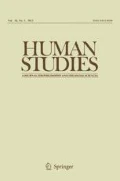Abstract
The new scientific cosmology which has emerged over the past forty years seems to be forcing philosophers and theologians alike to rethink the traditional theistic conception of God in which God is pictured as a First Cause designer of the universe in favor of what Joseph Campbell more mystically calls an “immanent ground of being, transcendent of conceptualization.” The central thrust of these reflections is that we encounter that “immanent ground of being” through the experience of wonder and awe. Since actual experience is involved, then a phenomenological description of exactly what it is in the new cosmology (and the universe) which induces such wonder is possible. The basic thesis is that we experience wonder in the face of the remarkable and transcendent (beyond finite predicates and understanding) coming-into-being of nature over twelve to fifteen billion years. Wonder is the human reaction to and appreciation for the astounding fact that nature and all of its parts actually are. It is; we are; such is the ineffable beyond in our midst.
Similar content being viewed by others
References
Angulo, Jaime de (11 Oct., 1992). Quoted by R. Moss, We Are All Related. In “Parade Magazine,” The Boston Globe.
Berry, T. (1991). Befriending the Earth: A Theology of Reconciliation Between Humans and the Earth. Mystic, CN: Twenty-Third Publications.
Blake, W. (1970). The Marriage of Heaven and Hell, plate 14. In J. Singer, The Unholy Bible. New York: Putnams.
Boff, L. (1995). Ecology and Religion: A New Paradigm. Maryknoll, NY: Orbis Books.
Borg, M. (1994). Meeting Jesus for the First Time. San Francisco: Harper.
Brueggemann, W. (1992). Transforming the Imagination. In Books and Religion, (Spring).
Campbell, J. (1988). The Mythological Dimension. Historical Atlas of World Mythology, Vol. 1. New York: Perennial Library.
Davies, P. (1983). God and the New Physics. New York: Touchstone, Simon and Schuster.
Eckhart, M. (1980). Breakthrough: Meister Eckhart's Creation Spirituality. New York: Doubleday.
Eisley, L. (1960). The Firmament of Time. New York: Atheneum.
Eliade, M. (1961). The Sacred and the Profane. Trans. W. Trask. New York: Harper & Row.
Emerson, R.W. (1981). Nature. In C. Bode (Ed.), The Portable Emerson. New York: Penguin Books, USA.
Haught, J.F. (1990). Religious and Cosmic Homelessness. In Birch, Eakin and McDaniel (Eds.), Liberating Life: Contemporary Approaches to Ecological Theology. Maryknoll, N.Y.: Orbis Books.
Hawking, S. (1988). A Brief History of Time: From Big Bang to Black Holes. New York: Bantam Books.
Irwin, J. (1988). The Home Planet, Ed., K. Kelley. Reading, MA.: Addison Wesley.
Kelley, K.W., (Ed.). (1988). The Home Planet. Reading, MA: Addison Wesley.
Kohak, E. (1984). The Embers and the Stars: A Philosophical Enquiry into the Moral Sense of Nature. Chicago: University of Chicago Press.
Kolb, D. (1986). The Critique of Pure Modernity. Chicago: University of Chicago Press.
Leakey, R. (1992). Origins Reconsidered. New York: Anchor Books.
Makarov, O. (1988). The Home Planet, ed., K.W. Kelley. Reading, MA: Addison Wesley.
Malcolm, N. (1958). Ludwig Wittgenstein: A Memoir. London: 1958.
McFague, S. (1993). The Body of God. Minneapolis: Fortress Press.
Mitchell, E. (1988). The Home Planet, ed., K.W. Kelley. Reading, MA: Addison Wesley.
Morris, T.V., (ed.). (1987). The Concept of God. Oxford Readings in Philosophy. Oxford: Oxford University Press.
Murdoch, I. (Fall, 1959). The Sublime and the Good. Chicago Review (13): 000.
Otto, R. (1958). The Idea of the Holy. Trans. J. W. Harvey. New York: Oxford University Press
Overbye, D. (1991). Lonely Hearts of the Cosmos. New York: Harper Collins.
Pollard, W. (1974). The Mystery of Matter. U.S. Atomic Energy Commission, Office of Information Services.
Proudfoot, W. (1985). Religious Experience. Los Angeles: University of California Press.
Ricoeur, P. (1967). Philosophy of Will and Action. In Straus and Griffiths (Eds), Phenomenology of Will and Action. Pittsburgh: Duquesne University Press.
Schweitzer, A. (1933). Out of my Life and Thought. Trans. C.I. Campion. New York. Henry Holt & Co.
Sproul, B.C. (1991). Primal Myths: Creation Myths Around the World. San Francisco: Harper.
Weber, R. (1990). Dialogues With Scientists and Sages. London: Arkana.
Wheeler, J. (1988) in an interview with T. Ferris, quoted by Ferris in his Coming of Age in the Milkyway. New York: Anchor.
Wittgenstein, L. (1974). Tractatus Logico-Philosophicus. London: Routledge and Kegan Paul.
Author information
Authors and Affiliations
Rights and permissions
About this article
Cite this article
Brockelman, P. The Miracle of Being: Cosmology and the Experience of God. Human Studies 20, 287–301 (1997). https://doi.org/10.1023/A:1005384803984
Issue Date:
DOI: https://doi.org/10.1023/A:1005384803984




